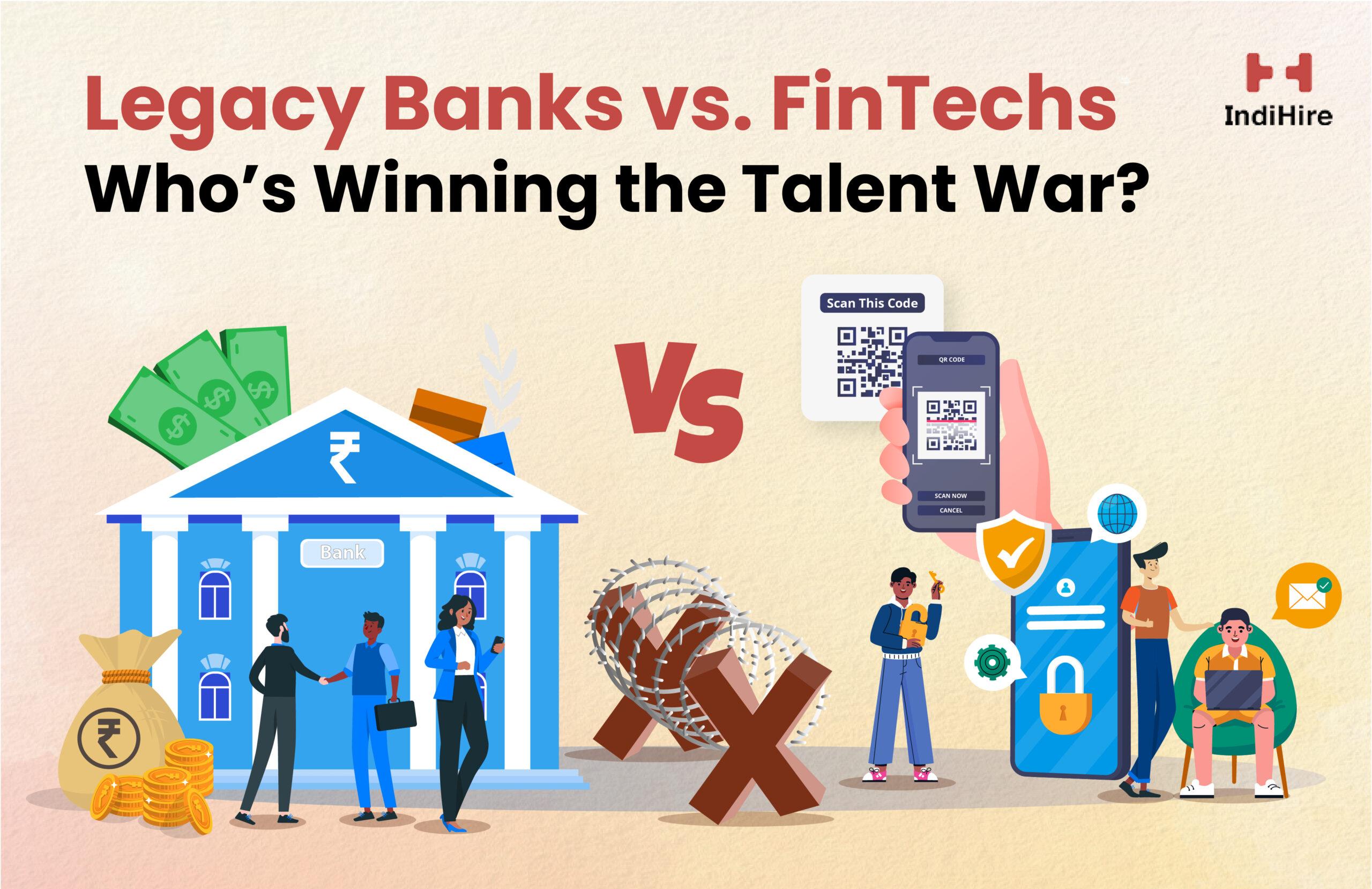Legacy Banks vs FinTechs – Who is Winning the Talent War?

Reading Time: 5 min
As a talent acquisition professional, you have probably felt it: the talent market in finance has gone from musical chairs to chess.
Both legacy banks and FinTechs are chasing the same top talent – AI engineers, risk pros, product managers, and builders who turn ideas into actual features.
Compensation is loud, but it is not the whole story. Culture, growth potential, and trust have become key factors in attracting and retaining top professionals.
So, who’s really winning? Let’s understand and get practical about what works.
What is Happening in the Market?
Hiring is selective but serious. Enterprise AI has moved from pilot to production, regulators are watching more closely, and profitable growth is back.
Big banks are still spending big on tech. Several have thousands of technologists and multi-billion-dollar tech budgets. That scale attracts people who want to build something with real impact. Meanwhile, FinTech funding is uneven, but the winners are hiring with intention – fast product development, modern stacks, and clear missions.
Candidates are choosier. They care about work quality, the actual roadmap, and whether their work matters. A fancy title with slow delivery is no longer effective.
What top candidates want now –
- Flexible work with clear norms, not “maybe hybrid”. Provide clarity like “Fixed 2 days in-office, 3 days remote”.
- A manager they trust. People pick people. They leave them too.
- A product roadmap they can believe in.
- Transparent pay and levels.
- Tools and learning that matter: support when needed.
Legacy Banks vs FinTechs
Instead of debating endlessly about winners and losers, let’s shift focus and carefully examine what each brings to the table when hiring top talent.
What Legacy Banks Bring to the Table
Legacy banks are not exactly sitting ducks in this talent war. They have got some serious things going for them, attracting talent towards them:
Everyone wants Stability. Remember 2023’s tech layoffs? While FinTechs were cutting staff, traditional banks kept their workforce relatively intact. Suddenly, that “boring” bank job started looking pretty attractive.
The compensation packages at established banks can make your eyes water – in a good way. We are talking structured bonuses, comprehensive healthcare, pension contributions that actually mean something, and enough job security to get a mortgage.
Plus, there is something to be said about working for an institution that has survived multiple financial crises. It is like dating someone with a solid credit score – not flashy but deeply reassuring.
Global opportunities are another ace up their sleeve. Want to transfer to Singapore? Tokyo? London? Legacy banks can make it happen. Try doing that at a 50-person FinTech startup.
The FinTech Counterattack
Now, before you think FinTechs are all style and no substance, let us stop you right there. They are rewriting the recruitment playbook, and it is working.
Innovation is not just a buzzword here. FinTech employees are not maintaining decades-old systems. The fast-paced environment enables them to build AI-powered fraud detection systems before lunch and payment infrastructure in the afternoon.
For tech talent, this is like choosing between maintaining a vintage car and designing a spaceship.
The work culture? It is everything millennials and Gen Z wanted. Remote-first policies, mental health days, and leadership teams where the average age does not require reading glasses.
And let’s talk about equity. Sure, it might be worth nothing today, but what if you are sitting on the next Stripe? It is the lottery ticket that keeps talented professionals hitting “accept offer” – even when the base salary is lower than what JPMorgan would pay.
Who is Actually Winning?
Here comes the plot twist. The real winners are the candidates themselves. When you have banks offering FinTech-style perks and FinTechs providing bank-level stability, talent has never had it better. Software engineers are commanding top salaries.
But if we are keeping score, here’s the uncomfortable truth for legacy banks – FinTechs are a little ahead. They own the conversation around innovation, purpose, and the future of finance. When was the last time a computer science graduate dreamed of working at a traditional bank?
That said, legacy banks are winning the retention game. Once they get talent in the door, they are surprisingly good at keeping it. Consistent bonuses and job security have a way of making people stick around.
The Million-Dollar Question for TA Professionals
So, what does this mean for you, sitting there with positions to fill and hiring managers breathing down your neck?
First, stop trying to outshine your competitor. Instead, figure out what makes your organisation genuinely unique. Maybe it is your regulatory expertise, your customer base, or that wonderful company culture you have cultivated.
Second, flexibility is your new best friend. Cannot match a FinTech’s equity package? Or maybe you cannot provide banking-level bonuses? Provide perks that matter to the individual. Maybe they want a fully remote option or simply some paid mental health days.
Finally, remember one thing – the best talent is not looking for perfection. Instead, they are looking for potential. Whether you are a 200-year-old bank or a two-year-old startup, show candidates how they will grow, what they will build, and why it matters.
The Bottom Line
The talent war between legacy banks and FinTechs is not ending anytime soon. If anything, it is intensifying as the lines between traditional and digital finance continue to blur.
Legacy banks are learning to move like startups, while FinTechs are discovering the value of institutional knowledge. The real question is not who is winning today, but who is preparing better for tomorrow.
So, what is your move? Are you still fighting yesterday’s talent war, or are you ready to write the next chapter? Because your competitors are not waiting around to find out.


